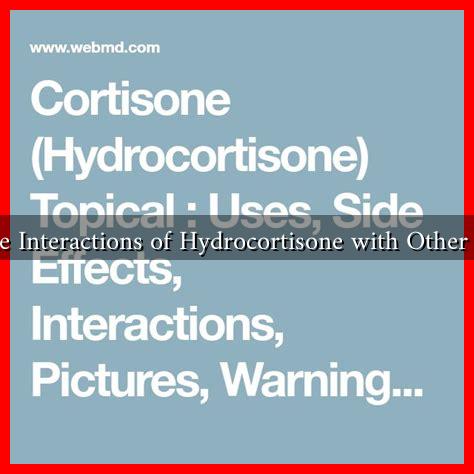-
Table of Contents
What Are the Interactions of Hydrocortisone with Other Medications?
Hydrocortisone, a synthetic glucocorticoid, is widely used in the treatment of various inflammatory and autoimmune conditions. While it is effective in managing symptoms, it is crucial to understand its interactions with other medications. These interactions can significantly impact the efficacy of treatment and the safety of patients. This article delves into the various interactions of hydrocortisone with other medications, providing insights into their implications.
Understanding Hydrocortisone
Hydrocortisone mimics the effects of cortisol, a hormone produced by the adrenal glands. It is commonly prescribed for conditions such as:
- Adrenal insufficiency
- Allergic reactions
- Autoimmune diseases (e.g., lupus, rheumatoid arthritis)
- Skin conditions (e.g., eczema, psoriasis)
Despite its therapeutic benefits, hydrocortisone can interact with various medications, leading to altered drug effectiveness or increased risk of side effects.
Common Drug Interactions with Hydrocortisone
Hydrocortisone can interact with a range of medications, including:
- Anticoagulants: Hydrocortisone may enhance the effects of anticoagulants like warfarin, increasing the risk of bleeding. Regular monitoring of INR levels is recommended.
- Antidiabetic medications: Corticosteroids can raise blood glucose levels, potentially necessitating adjustments in insulin or oral hypoglycemic agents.
- Nonsteroidal anti-inflammatory drugs (NSAIDs): The combination of hydrocortisone and NSAIDs can increase the risk of gastrointestinal bleeding.
- Antibiotics: Certain antibiotics, such as rifampin, can reduce the effectiveness of hydrocortisone by increasing its metabolism.
- Vaccines: Patients on hydrocortisone may have a reduced immune response to live vaccines, making them less effective.
Case Studies and Clinical Evidence
Several studies have highlighted the importance of monitoring drug interactions with hydrocortisone. For instance, a study published in the Journal of Clinical Endocrinology & Metabolism found that patients receiving hydrocortisone alongside warfarin had a significantly higher risk of bleeding complications. The study emphasized the need for careful dose adjustments and regular INR monitoring in such cases.
Another case study involving a patient with diabetes mellitus showed that the introduction of hydrocortisone therapy led to a marked increase in blood glucose levels, necessitating an increase in insulin dosage. This case underscores the need for healthcare providers to closely monitor blood glucose levels in patients receiving hydrocortisone.
Managing Drug Interactions
To minimize the risks associated with hydrocortisone interactions, healthcare providers should consider the following strategies:
- Comprehensive Medication Review: Conduct a thorough review of all medications a patient is taking to identify potential interactions.
- Patient Education: Inform patients about the signs of potential side effects and the importance of adhering to prescribed dosages.
- Regular Monitoring: Schedule regular follow-ups to monitor the patient’s response to treatment and adjust dosages as necessary.
- Collaboration with Pharmacists: Engage pharmacists in the medication management process to identify and mitigate potential interactions.
Conclusion
Hydrocortisone is a powerful medication that can significantly improve the quality of life for patients with various conditions. However, its interactions with other medications can pose serious risks. Understanding these interactions is essential for healthcare providers to ensure safe and effective treatment. By conducting thorough medication reviews, educating patients, and implementing regular monitoring, healthcare professionals can mitigate the risks associated with hydrocortisone therapy. Ultimately, a collaborative approach involving patients, healthcare providers, and pharmacists is key to optimizing treatment outcomes.

